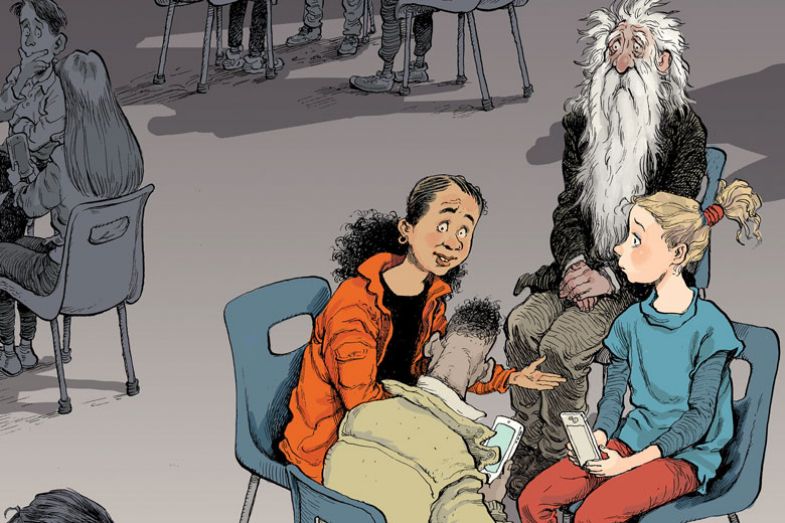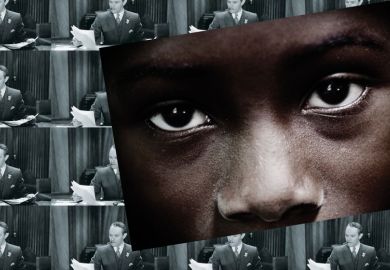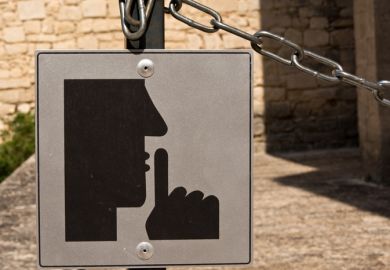Professor Rick Van Winkle strode out of the gym, glistening with sweat. He worked out every day around noon, when most of his colleagues gathered in the faculty cafeteria to complain about Republicans, undergraduates and campus parking. Rick was a dyed-in-the-wool Democrat, but he had grown weary of the formulaic attacks on the Grand Old Party. How can we learn, he often asked himself, when we all agree with each other?
Nor did Rick enjoy hearing yet another story about dumb students who thought Darwin wrote The Organ of the Species or that Malcolm X was “Malcolm the Tenth”. OK, they were funny the first time. But that was a long time ago. They’re kids, he thought to himself; give them a break. They also pay the bills – and our salaries.
So Rick spent more time than ever before in the gym. Sinewy muscles lined his middle-aged body. There was a reason that students had taken to calling him “Ripped” Van Winkle.
He made his way back to his department, across the college green. Students were playing Frisbee, which always made him nostalgic. A pair of little kids had set up a lemonade stand. Rick was thirsty from his workout, and the kids were cute. So he fished a quarter out of his pocket and put it on their table.
The kids poured a cup for Rick out of a large plastic jug. He raised the cup to his lips and downed the drink in a single gulp. Suddenly, he felt sleepy. The green, the Frisbees and the lemonade blurred into each other. He lay down and closed his eyes.
Rick woke up in class. In his class. He was seated at the front of a seminar table, as usual. But something was off.
He had planned a discussion about the history of political protest, which was one of Rick’s academic specialties. He liked to begin his classes with a present-day episode and move backwards. It was the opposite of what he had learned to do in grad school, but it worked.
And this one would be easy, because the 6 January Capitol riot had taken place just a few weeks earlier – or so he thought.
“Where were you, when you first heard about 6 January?” Rick asked, to get the ball rolling.
Blank stares. Awkward silence. Finally, a student came to Rick’s rescue.
“Professor,” she said, “what happened on 6 January?”
Rick was a patient teacher, but he still felt a little sleepy from his rather long nap. “You don’t remember 6 January?” he snapped, visibly annoyed. “The riot at the Capitol, earlier this year? The biggest story of 2021? Where have you been?”
Then another student piped up, a brash-sounding kid with a beard and a man-bun. “Professor, where have you been?” he asked. “It’s 2041!”
Rick looked around the room. He was usually pretty good with student names, but he couldn’t remember any of them. In fact, he didn’t recognise any of their faces either.
He had no idea where he had been. But he was here now.
“OK, so tell me about the riot at the Capitol, back in 2021.”
Of course Rick wanted to ask his students a million other things, about what had happened since he fell asleep. But there would be time for that later. Right now, he had a class to teach.
“It depends on your point of view,” a student replied. “Professor, do you want us to sit in Multiple Perspective Circles?”

Rick didn’t know what they were, but they sounded like a good idea. He had always tried to introduce different points of view in his classroom. But he had his own opinions, of course, and he had noticed over the years how his students came to share them. He was the teacher, after all.
“Sure,” Rick replied, curious to know more.
The students took it from there. They arranged themselves in groups of three and pulled out their phones. Typing “January 6, 2021 riot” into their MultiView apps, they found distilled descriptions of three different perspectives on the event. Each student had to make the case for one of them, while the other members of the circle listened and took notes.
One interpretation held that the riot was caused by spasms of white racism that had seized the country during the presidency of Donald Trump. Another attributed it to widening economic equality, which had left many of the protesters in dead-end jobs. Still another described it as mainly a media spectacle, spawned by websites whose main goal was to gin up traffic.
“Shall we Square the Circle?” a student asked, about 20 minutes into the class.
Rick didn’t know what that was, either, but he wanted to find out.
“Let’s do it,” he said.
The students moved out from their circles into a square, with their positions assigned randomly by an app on their phones. If you were on Side 1, you had to argue for the first perspective; students on Side 2 argued for the second one, and those on Side 3 for the third. The students on the fourth side acted as moderators, asking questions of the other three.
Rick was mesmerised. “President Rubio said that the riot was a ‘cry of the dispossessed’, and I think he was right,” he heard a student say.
Wait, Rick wanted to ask, that Rubio? But he bit his tongue, focusing instead on the way the students were interacting. This wasn’t like any classroom he could recall. Back in the day, only a few students spoke up. And their politics mostly echoed the dictates of woke, a term that made the still-groggy Rick laugh to himself. You’re not really woke until you have slept for 20 years, he thought.
These students were different, Rick saw, because they had been taught to talk with each other. Not at each other, or around each other. With each other.
In addition to moderating the discussion, the people on Side 4 awarded “listening points” to students who drew on statements from other sides of the square. But you had to do it the right way. If a student demeaned someone, even with an eye roll, their group got a point taken off. But if they commented carefully and respectfully about a remark from another side, their group received two points.
The students were into it, because everyone loves a good game. And the winner wasn’t the group that made the strongest argument, as in the debates that Rick remembered from his suddenly distant youth. It was the group that listened the best.
Rick stepped out of class into the glaring sunshine, shielding his eyes with his hand. After 20 years of slumber, it was hard to adjust to the light.
He wandered on to the green and paused at The Pole, where students tacked up announcements. It looked just like he remembered. Someone was seeking a ride to Boston over the weekend; somebody else had lost a cat; and a third person was selling a couch. And there were dozens of posters for campus events, most of them stamped with the same MultiView logo he had seen on his students’ phones.
He recognised a member of his class, who waved to him as she walked by.
“Excuse me,” he said, calling after her. “What’s up with the logo on the posters?”
The student smiled. “That’s to make sure we hear multiple views, just like it says,” she answered. “Who wants to hear just one?”
“Lots of people,” Rick thought to himself. But he heard her out. If you wanted to sponsor a speaker, she said, you had to agree to invite another person with a different perspective. There was an app for that, too, which would suggest several contrasting speakers when you plugged in the name of whomever you wished to invite.
She pointed to an event scheduled for next week. The “headliner” was in bigger type, she explained, but if you looked below him you saw two more names. They were the “respondents”, she said.
“I heard these things were called ‘speeches’ in the old days,” she added brightly. “We call them ‘dialogues’ now.”
Rick gazed upwards, to a large green sign above the clutter of posters: DIALOGUE DEPOT. The Pole had a new name now.
“So what happens if a group doesn’t want a dialogue?” Rick asked. “What if they just want to hear from one person?”
“That’s their right and their choice,” the student replied. “But they have to do it on their own dime. The college won’t help them.” They could use campus space, she said, but that was it. The college wouldn’t pay for their pizza, and it definitely wouldn’t provide a fee to their speaker.
Rick was wide awake now. This was getting interesting.
His next stop was his own department, which he had been dreading: the knowing looks, the knee-jerk politics, the dull culture of complaint. But it was all new faces, just like his class. Almost all of them were younger than Rick. In the restroom near his office, he caught a glimpse of himself in the mirror and stopped short. He had grown a long white beard, reaching down nearly to his chest.
Rick was surprised to find that he still had a mailbox at the department. Reaching inside, he pulled out a pile of book catalogues and old journals – just the kind of junk he remembered. But atop the stack was a computer printout, detailing the Viewpoint Range (VR) of his class earlier that day. Apparently, an app in Rick’s phone had recorded his class and counted the length of time that different people talked. More remarkably, student comments were also coded for political content and plotted on a bar graph. If your graph showed a wide range of political opinion, you got a high VR; if people mostly said the same kind of things, your VR went down. In a second graph, Rick’s VR was compared with those of other professors in the department. He was in the 60th percentile. Not bad for a guy who had been asleep for two decades, he thought to himself. But he knew he could do better.
The other unexpected item in his box was a memo describing the search for a new departmental faculty member. The search committee had winnowed the field down to four candidates, whose CVs were attached. So was a letter from the vice-provost for diversity. “The university is an equal opportunity employer,” the letter began. “We especially seek candidates from under-represented racial, ethnic and gender groups.” That much Rick remembered, from the old days. But the next paragraph was a shocker:
“We also seek candidates of different political and ideological backgrounds. The courts have continued to allow us to use race and gender as ‘plus’ factors in making hires, on the grounds that a more diverse faculty will yield a wider array of perspectives. But unless we attend to viewpoint diversity, too, we risk creating a faculty where people look different but think the same.”
Questions ricocheted through Rick’s addled brain. How would committees know the politics of an applicant? Should they ask? Wasn’t that intrusive, and possibly illegal? And wouldn’t we end up discriminating against candidates who held opinions that the search committee didn't share?
There was an app for that, too. As he discovered by reading further, every candidate’s social media footprint was analysed by the Online Politics Meter (OPM). And each year, the deans ranked departments on their faculty’s ideological diversity as well as their racial and gender makeup. Departments that had too much of a single group – by race, gender or politics – had to submit plans for how they would create more balance. Nothing would ever be perfect, the vice-provost’s letter acknowledged. But slowly, the university was becoming a place where all kinds of diversity were sought, recognised and celebrated.
Rick Van Winkle wanted to celebrate, too. All this seemed like a dream, and maybe it was. But he would enjoy it until he woke up – again.
Jonathan Zimmerman is the Berkowitz professor in education at the University of Pennsylvania. He is the co-author (with cartoonist Signe Wilkinson) of Free Speech and Why You Should Give a Damn.
POSTSCRIPT:
Print headline: Professor Van Winkle wakes up to viewpoint diversity
Register to continue
Why register?
- Registration is free and only takes a moment
- Once registered, you can read 3 articles a month
- Sign up for our newsletter
Subscribe
Or subscribe for unlimited access to:
- Unlimited access to news, views, insights & reviews
- Digital editions
- Digital access to THE’s university and college rankings analysis
Already registered or a current subscriber?








